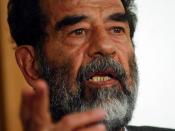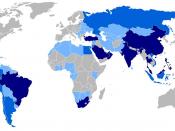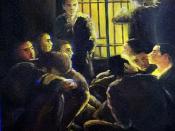Authoritarian Rule is Good for Developing Countries
INTRODUCTION
It is often said that developing countries do not have the luxury of democracy. Prof. David Byrne (2005, p. 28), Director of Postgraduate Studies in the School of Applied Social Sciences, University of Durham, has argued that freedoms and individualism that Western democracy is so adept in emphasising are ineffective tokens for the majority who live in poverty.
The aim of this paper is to illustrate the detrimental effects premature democracy can bear upon developing countries, their people, upon the institution of democracy and the future democratic transitions. It is not the intention of this paper to claim that authoritarian rule is a more superior form of governance than democracy, or that authoritarianism is the only governance system feasible for developing countries.
What is being proposed is, due to the indigenous cultures, traditions, power structures, ideologies, institutions, values and history of inherent in many developing countries, democracy today would have very little chance for success (Pinkney, 2003).
The installation of Western democracy into developing countries that lack the political infrastructure, institutions, traditions of conflict management, power structures or education to sustain it, risk more damage to most than their current form of authoritarian governance.
In the content following, I will be discussing the concept of authoritarian rule, the five fundamental elements found to be essential for a successful democracy, and provide several accounts of democratic transitions.
AUTHORITARIANISM
The term Authoritarian rule did not originally carry the sinister undertones it now suggests. The traditional meaning of Authoritarianism proposes WHO ruled, and favoured obedience to authority. For example, a Monarch, Elder, Chief, Sultan. "The power of traditional authoritarian rule was neither unlimited nor arbitrary" (Hague & Harrop, 2001, p. 31), and nor were all leaders feared or despised.
The modern construal of Authoritarianism projects...


